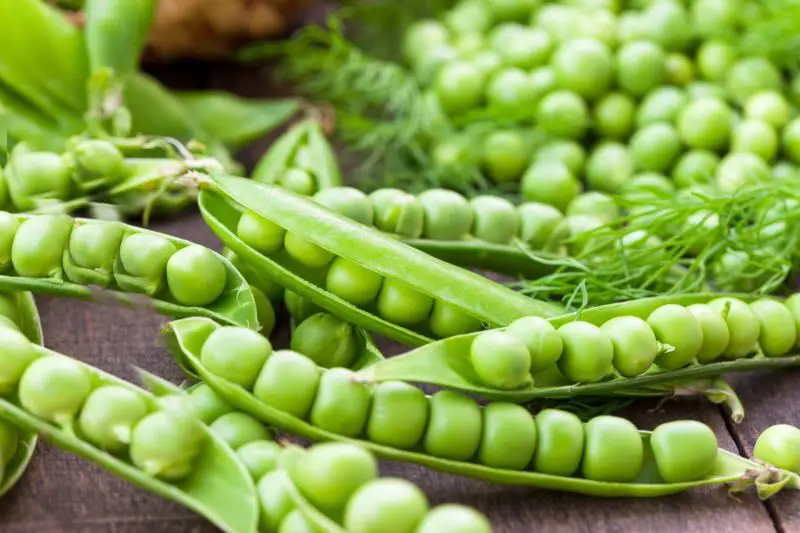Sweet peas may be small, but they carry a surprising amount of goodness in every bite. With their tender texture and naturally sweet flavor, these little green gems have long been a favorite on spring and summer dinner plates. But beyond their delicious taste lies a treasure trove of health benefits that many people overlook. Whether you enjoy them fresh, steamed, or tossed into your favorite stir-fry, sweet peas are more than just a colorful side dish—they’re a powerful, plant-based boost for your body.
In a world that often leans toward processed snacks and fast food, sweet peas are a gentle reminder of how nature provides everything we need to stay healthy. Rich in essential nutrients, fiber, and plant compounds, sweet peas quietly support heart health, improve digestion, and even help protect against chronic diseases. If you’ve ever asked yourself whether sweet peas are truly good for you, you’re about to discover just how much goodness is packed into these tiny pods.
Understanding Sweet Peas and Their Nutritional Value

Sweet peas, also known as garden peas or English peas, are the immature seeds of the Pisum sativum plant. Unlike field peas or split peas, sweet peas are harvested young, when their pods are tender and the peas inside are naturally sweet and rich in moisture. These small, round legumes are more than just a garden favorite—they’re a nutrient-dense food that contributes significantly to a balanced diet.
A single cup of cooked sweet peas provides around 130 calories, with a good balance of protein, fiber, and carbohydrates. Each serving offers roughly 8 grams of protein, making peas one of the best plant-based protein sources available. They’re also packed with dietary fiber—about 9 grams per cup—which helps promote satiety, supports digestive health, and may aid in weight management.
In terms of vitamins and minerals, sweet peas are especially rich in vitamin C, vitamin K, and several B vitamins like folate and thiamine. Vitamin C plays a crucial role in boosting immune health and protecting cells from oxidative damage, while vitamin K is essential for bone strength and blood clotting. The B vitamins found in peas help convert food into energy and support healthy brain function.
Sweet peas also deliver a generous dose of essential minerals such as manganese, magnesium, iron, zinc, and phosphorus. These micronutrients are vital for bone development, red blood cell production, enzyme activity, and overall metabolic health. Perhaps most impressive is the fact that sweet peas contain phytonutrients—powerful plant compounds like saponins, flavonoids, and carotenoids—that have been linked to anti-inflammatory and antioxidant effects.
Whether fresh, frozen, or lightly cooked, sweet peas retain most of their nutrients and are incredibly easy to incorporate into daily meals. Their natural sweetness and satisfying texture make them an ideal choice for both children and adults seeking a wholesome, flavorful way to improve their health.
Sweet Peas Help Support a Healthy Digestive System
Sweet peas are excellent for digestive health thanks to their high fiber content. One cup of cooked sweet peas contains about 9 grams of fiber. This amount covers over one-third of the daily recommended intake for most adults.
Sweet peas offer both soluble and insoluble fiber. Soluble fiber forms a gel in the gut, which slows sugar and fat absorption. It also feeds beneficial gut bacteria. These microbes help produce short-chain fatty acids like butyrate. Butyrate reduces inflammation and strengthens the intestinal lining.
Insoluble fiber adds bulk to stool and helps food move through the intestines. This prevents constipation, bloating, and irregular bowel movements. It also supports overall digestive comfort.
Sweet peas are gentle on the stomach. They contain no additives and are naturally low in fat. Their anti-inflammatory compounds may help soothe irritation in the gut. Eating sweet peas regularly can improve digestion and support long-term gut health.
They Can Stabilize Blood Sugar Levels Naturally
Sweet peas are rich in complex carbohydrates and fiber. These nutrients slow down the absorption of sugar into the bloodstream. As a result, blood sugar levels rise more gradually after meals. This helps reduce energy spikes and crashes throughout the day.
The fiber in sweet peas also supports insulin sensitivity. It helps the body use insulin more effectively. This can lower the risk of type 2 diabetes over time.
Sweet peas also contain a small amount of protein. Protein works with fiber to slow digestion. This steady process keeps glucose levels more stable after eating.
In addition, sweet peas have a low glycemic index. This means they do not cause sharp increases in blood sugar. Eating foods with a low glycemic index is helpful for blood sugar control.
Including sweet peas in your meals may help reduce sugar cravings. When your blood sugar is stable, you’re less likely to feel hungry too soon. This makes sweet peas a smart choice for people managing their glucose levels.
Sweet Peas Contribute to Heart Health and Circulation
Sweet peas contain nutrients that support cardiovascular health. They are especially high in potassium and magnesium. These minerals help relax blood vessels and lower blood pressure naturally.
The fiber in sweet peas also plays a key role. It helps reduce levels of bad cholesterol in the blood. Lower cholesterol means a lower risk of clogged arteries and heart disease.
Sweet peas are rich in antioxidants like flavonoids and carotenoids. These compounds fight inflammation in blood vessels. Reducing inflammation helps prevent damage to arteries and improves blood flow.
Folate is another heart-friendly nutrient found in sweet peas. It helps regulate homocysteine levels in the blood. High levels of homocysteine have been linked to increased heart disease risk.
Regularly eating sweet peas may also help keep your arteries flexible. This improves circulation and reduces the strain on the heart. Good circulation ensures that oxygen and nutrients reach all parts of the body.
Overall, sweet peas offer a gentle yet effective way to protect your heart. They work best when eaten as part of a balanced, plant-rich diet.
They Offer Powerful Antioxidants to Fight Inflammation
Sweet peas are a natural source of powerful antioxidants. These compounds protect cells by neutralizing free radicals. Free radicals are unstable molecules that cause damage inside the body. Over time, they contribute to aging and chronic disease. By reducing this damage, antioxidants support long-term health.
Vitamin C is one of the key antioxidants found in sweet peas. It helps lower inflammation and strengthens the immune system. This vitamin also supports tissue repair and healing. Along with vitamin C, sweet peas contain flavonoids—plant chemicals known to reduce inflammation. These may protect blood vessels and joints.
Carotenoids like lutein and zeaxanthin are also present. They are especially helpful for eye health and reduce stress in sensitive tissues. Together, these antioxidants help your body stay balanced and resilient. Adding sweet peas to your diet is a simple way to fight inflammation naturally and feel more energized.
Sweet Peas Support a Strong Immune System
Sweet peas offer valuable nutrients that help build a stronger immune system. They are rich in vitamin C, which plays a direct role in immune defense. This vitamin helps stimulate the production of white blood cells. These cells are the body’s first line of defense against bacteria and viruses. A steady intake of vitamin C may also shorten the duration of colds.
In addition, sweet peas provide zinc and iron—two minerals essential for immune health. Zinc supports the function of immune cells and speeds up wound healing. Iron helps transport oxygen to tissues, keeping the body energized and ready to fight off illness. Without enough iron, the immune system can weaken over time.
Sweet peas also contain small amounts of vitamin A, which helps maintain healthy skin and mucous membranes. These surfaces are part of the body’s natural barrier against infection. Fiber in sweet peas supports gut health, which is closely tied to immune strength. A healthy digestive system allows for better nutrient absorption and waste removal. Together, these benefits make sweet peas a powerful ally for staying well year-round.
They Promote Healthy Weight Management
Sweet peas are an excellent food choice for those looking to manage their weight in a healthy and sustainable way. They are naturally low in calories and contain virtually no fat, making them a smart addition to meals without adding excess energy. Despite their low calorie count, sweet peas are packed with important nutrients like protein and dietary fiber—two key elements that help regulate hunger and increase satiety.
The high fiber content slows digestion, helping you feel full for longer after eating. This helps reduce the urge to snack between meals and can prevent overeating. At the same time, the plant-based protein in sweet peas supports muscle maintenance and metabolic activity, both of which are important for weight control.
Sweet peas also contain complex carbohydrates that release energy gradually. This helps maintain balanced blood sugar levels and avoid energy crashes that often lead to sugar cravings. By providing steady energy, they support physical activity and reduce the likelihood of reaching for processed or high-calorie snacks.
Their versatility makes it easy to add them to a wide range of dishes—from salads and soups to stir-fries and grain bowls—without relying on heavy sauces or calorie-dense ingredients. Whether used as a side dish or a protein base in plant-forward meals, sweet peas make healthy eating more enjoyable and sustainable over time.
They’re Gentle on the Environment and Support Sustainable Eating
Sweet peas aren’t just nutritious—they’re also a smart choice for the planet. As legumes, they naturally enrich the soil by fixing nitrogen through their roots, reducing the need for synthetic fertilizers and supporting healthier farmland.
Compared to animal-based proteins, sweet peas require far less water, land, and energy to grow. Producing peas emits significantly fewer greenhouse gases and avoids methane, making them a lower-impact protein source.
They grow quickly, adapt to many climates, and are often part of crop rotation, which helps reduce soil erosion and pests while improving long-term yields. Their short growing season and local harvest potential also lower transport emissions and support regional agriculture.
Sweet peas store well, freeze easily, and have low spoilage rates, which means less food waste. They’re also affordable and widely available in dried, canned, or frozen forms—making sustainable eating accessible to more people.
Choosing peas more often is a simple, effective way to support the environment and move toward a healthier, more resilient food system.
How to Add More Sweet Peas to Your Daily Diet
FAQ About Benefits of Sweet Peas
Are sweet peas the same as green peas?
No, sweet peas and green peas are not the same. Sweet peas often refer to the young, tender peas found in varieties like snow peas or sugar snap peas. These can be eaten whole, including the pod. Green peas (or garden peas) are shelled from tougher pods and eaten as the round seeds inside. Both are nutritious, but sweet peas are often sweeter and more delicate in flavor. They are usually eaten fresh or lightly cooked.
Can I eat sweet peas raw?
Yes, sweet peas can be eaten raw. In fact, they are delicious straight from the vine when freshly picked. Raw sweet peas are crisp, slightly sweet, and full of nutrients like vitamin C, fiber, and antioxidants. To enjoy them raw, add to salads, dip into hummus, or snack on them as is. Make sure to wash them thoroughly before eating. Avoid eating ornamental sweet peas, as those are not edible and can be toxic.
Are sweet peas good for weight loss?
Sweet peas are excellent for weight loss. They are low in calories but high in fiber and protein, which help you feel full longer. One cup of sweet peas contains only about 60 calories. Their fiber slows digestion and reduces cravings. Adding sweet peas to meals can reduce your total calorie intake without sacrificing flavor or satisfaction. They also support stable blood sugar levels, which is helpful for managing hunger and metabolism.
How should I store sweet peas to keep them fresh?
To keep sweet peas fresh, store them in the refrigerator. Place them in a perforated plastic bag or loosely wrapped in a damp paper towel. They can last about 3 to 5 days when refrigerated properly. For longer storage, blanch and freeze them. Blanching preserves their flavor, texture, and nutrients. Simply boil for 1 to 2 minutes, then transfer to ice water, drain, and freeze in airtight bags or containers.
Are sweet peas safe for people with diabetes?
Yes, sweet peas are safe for people with diabetes when eaten in moderation. They have a low glycemic index, which means they do not cause sharp spikes in blood sugar. Their fiber content helps slow carbohydrate absorption. This promotes more stable glucose levels. Sweet peas also offer plant-based protein, making them a good option for blood sugar control. However, always check with a healthcare provider for personalized dietary advice.
Conclusion
Sweet peas may look small, but they carry remarkable benefits for your body and the planet. From supporting heart and digestive health to balancing blood sugar and strengthening your immune system, these humble green gems truly earn their place on your plate. They’re gentle, nourishing, and naturally full of what your body needs to thrive.
Adding more sweet peas to your daily meals isn’t just a healthy choice—it’s a joyful one. Their tender sweetness, satisfying crunch, and environmental friendliness make them a perfect companion in a modern, mindful diet. So go ahead—embrace the power of sweet peas, one delicious bite at a time.






